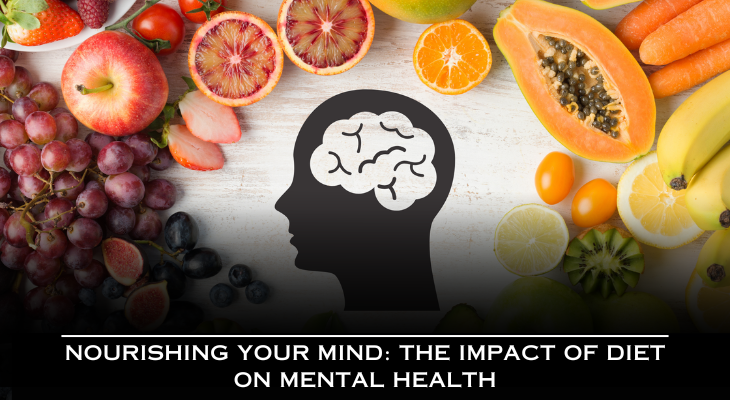- Introduction
- Historical Context and Evolution of Research On Dietary Choices and Brain Health
- Key Findings in Recent Research ON Dietary Choices and Brain Health
- Mechanisms Underlying Diet-Brain Interactions
- Diet and Mental Health
- Practical Implications and Recommendations
- Case Studies and Real-World Applications
- Future Directions in Research on Dietary Choices and Brain Health
- Conclusion
- Research Sources & Supportive Studies
Introduction
In recent years, the burgeoning field of nutritional neuroscience has increasingly spotlighted the intricate connection between diet and brain health. This emerging body of research has underscored that what we eat profoundly impacts not only our physical health but also our cognitive function and mental well-being. As scientists delve deeper into understanding this relationship, new findings are revealing how dietary choices can influence brain structure, functionality, and susceptibility to neurodegenerative diseases.
Historical Context and Evolution of Research On Dietary Choices and Brain Health
Historically, the link between diet and brain health was primarily speculative, with early studies focusing on the impact of malnutrition and deficiencies on cognitive development. Early 20th-century research primarily concentrated on the negative effects of severe deficiencies, such as how lack of essential nutrients like iodine or vitamin B12 could lead to cognitive impairments or developmental delays.
The mid-20th century brought about an era where epidemiological studies began to hint at broader connections. For instance, populations with diets rich in certain foods, such as fish or vegetables, seemed to exhibit lower rates of cognitive decline and mental health issues. However, it wasn’t until the advent of modern neuroimaging and molecular biology techniques in the late 20th and early 21st centuries that researchers could begin to unravel the complex biochemical interactions between diet and brain function.
Key Findings in Recent Research ON Dietary Choices and Brain Health
Recent studies have unveiled several profound connections between dietary habits and brain health. These findings highlight not only the potential for diet to improve cognitive function and mental health but also its role in mitigating the risk of neurodegenerative diseases such as Alzheimer’s and Parkinson’s disease.
The Role of Omega-3 Fatty Acids
One of the most significant discoveries in this field is the role of omega-3 fatty acids, particularly docosahexaenoic acid (DHA), in brain health. Omega-3 fatty acids are crucial components of neuronal membranes and are involved in the synthesis of neurotransmitters and the modulation of inflammatory processes in the brain. Studies have shown that diets rich in omega-3 fatty acids, commonly found in fish like salmon and mackerel, are associated with better cognitive performance and a reduced risk of dementia. For example, a landmark study published in the *Journal of Neuroscience* demonstrated that higher levels of DHA in the blood are correlated with larger brain volumes and better memory function in older adults.
The Mediterranean Diet
The Mediterranean diet, characterized by high consumption of fruits, vegetables, whole grains, nuts, and olive oil, along with moderate intake of fish and poultry, has garnered attention for its cognitive benefits. Research indicates that adherence to the Mediterranean diet is associated with a slower rate of cognitive decline and a lower incidence of Alzheimer’s disease. A pivotal study published in the *Annals of Neurology* found that individuals who closely followed the Mediterranean diet had a 33% lower risk of developing Alzheimer’s disease compared to those who did not.
The Impact of Antioxidants
Antioxidants, such as vitamins E and C, flavonoids, and polyphenols, have also been shown to support brain health by neutralizing harmful free radicals and reducing oxidative stress, which is implicated in neuronal damage and cognitive decline. Berries, particularly blueberries, are rich in antioxidants and have been studied extensively for their neuroprotective properties. Research published in the *Journal of Agricultural and Food Chemistry* revealed that blueberry supplementation improved memory performance and motor function in older adults, likely due to increased neuronal signaling and enhanced neurogenesis.
Gut-Brain Axis and Probiotics
Emerging research on the gut-brain axis highlights the profound influence of gut microbiota on brain health. The gut microbiome, comprising trillions of microorganisms, communicates with the brain through neural, hormonal, and immune pathways. Certain bacteria in the gut, particularly probiotics and prebiotics, can influence cognitive function and mood. A study in the *Frontiers in Neuroscience* journal reported that probiotic supplementation improved symptoms of anxiety and depression, suggesting a potential therapeutic role for gut health in mental health disorders.
Dietary Fats and Brain Health
The type and quantity of dietary fats consumed also play a significant role in brain health. While omega-3 fatty acids have beneficial effects, trans fats and saturated fats are associated with negative outcomes. High intake of trans fats, commonly found in processed foods, is linked to increased inflammation and a higher risk of cognitive decline. Conversely, monounsaturated fats, present in olive oil and avocados, have been shown to support cognitive function and protect against neurodegenerative diseases.
New Research Shows ‘Profound’ Link Between Dietary Choices and Brain Health
Mechanisms Underlying Diet-Brain Interactions
Understanding the mechanisms through which diet influences brain health involves exploring various biological processes, including neuroinflammation, oxidative stress, neurogenesis, and synaptic plasticity.
Neuroinflammation impact on Dietary Choices and Brain Health
Chronic inflammation in the brain is a key factor in the development of neurodegenerative diseases. Diets high in refined sugars and unhealthy fats can promote systemic inflammation, which extends to the brain, exacerbating conditions like Alzheimer’s disease. Conversely, anti-inflammatory diets rich in fruits, vegetables, and omega-3 fatty acids can help mitigate neuroinflammation. The anti-inflammatory effects of these diets are partly mediated through the suppression of pro-inflammatory cytokines and the promotion of anti-inflammatory molecules.
Oxidative Stress
Oxidative stress results from an imbalance between free radicals and antioxidants in the body, leading to neuronal damage. Diets rich in antioxidants can help counteract oxidative stress and protect brain cells. Foods like berries, nuts, and dark leafy greens are particularly effective in enhancing the brain’s antioxidant defenses, thereby reducing the risk of cognitive decline.
Dietary Choices and Brain Health Impact on Neurogenesis
Neurogenesis, the process of generating new neurons, is crucial for maintaining cognitive function throughout life. Flavonoids found in cocoa and green tea promote neurogenesis in the hippocampus, a brain region essential for learning and memory. This neurogenesis enhancement is one mechanism through which these foods boost cognitive function.
Synaptic Plasticity
Synaptic plasticity refers to the ability of synapses (the connections between neurons) to strengthen or weaken over time, which is essential for learning and memory. Nutrients such as omega-3 fatty acids, antioxidants, and B vitamins enhance synaptic plasticity. For instance, omega-3 fatty acids facilitate the formation of new synapses and improve the fluidity of neuronal membranes, which enhances communication between brain cells.
Dietary Choices and Brain Health
Diet and Mental Health
Beyond cognitive function, diet also plays a significant role in mental health. The connection between dietary choices and mental health conditions like depression and anxiety is increasingly being recognized.
Depression
Research shows that diets high in processed foods, sugars, and unhealthy fats increase the risk of depression. In contrast, diets rich in whole foods, such as the Mediterranean diet, lower the risk of depression. A study published in the BMC Medicine journal demonstrated that individuals following a Mediterranean diet had a significantly lower risk of developing depression over a ten-year period compared to those who did not adhere to the diet. This protective effect is believed to be due to the diet’s anti-inflammatory properties and its positive impact on gut microbiota.
Anxiety
Similar to depression, anxiety disorders are also influenced by diet. Diets high in refined carbohydrates and sugars can lead to fluctuations in blood glucose levels, which may contribute to anxiety symptoms. Conversely, diets rich in complex carbohydrates, proteins, and healthy fats can stabilize blood glucose levels and reduce anxiety. Additionally, foods rich in magnesium, such as leafy greens and nuts, have been found to have calming effects on the nervous system and may help alleviate anxiety symptoms.

Practical Implications and Recommendations
The profound link between dietary choices and brain health underscores the importance of considering diet as a fundamental aspect of brain health maintenance and disease prevention. Here are some practical dietary recommendations based on recent research:
1. Increase Intake of Omega-3 Fatty Acids:
Incorporate more fatty fish (such as salmon, mackerel, and sardines), flaxseeds, and walnuts into your diet to boost omega-3 levels.
2. Adopt the Mediterranean Diet:
Emphasize fruit, vegetables, whole grains, nuts, olive oil, and moderate consumption of fish and poultry. Reduce intake of red meat and processed foods.
3. Consume Antioxidant-Rich Foods:
Include a variety of berries, nuts, seeds, and dark leafy greens in your diet to enhance antioxidant defenses and protect brain cells from oxidative stress.
4. Support Gut Health:
Incorporate probiotics (found in yogurt, kefir, and fermented foods) and prebiotics (found in garlic, onions, and asparagus) to maintain a healthy gut microbiome, which can positively influence brain health.
5. Limit Unhealthy Fats and Sugars:
Reduce consumption of trans fats and saturated fats, which are prevalent in processed and fried foods, and limit intake of refined sugars to decrease inflammation and stabilize blood glucose levels.
6. Include Magnesium-Rich Foods:
Add foods such as spinach, almonds, and black beans to your diet to ensure adequate magnesium intake, which can help reduce anxiety and promote overall brain health.
Case Studies and Real-World Applications
To further illustrate the impact of diet on brain health, consider the following case studies:
1. Case Study:
The Okinawa Diet:
Okinawa’s diet links to long life and healthy minds (highest life expectancies, lowest dementia rates). Okinawans live long and avoid dementia! Their diet might be the key. This diet is rich in vegetables, legumes, and seafood, with a significant emphasis on nutrient-dense, anti-inflammatory foods. Studies have shown that the cognitive health of Okinawa’s elderly population is remarkably robust, with lower instances of Alzheimer’s disease and other forms of dementia compared to Western populations.
2. Case Study:
The MIND Diet:
MIND diet blends Mediterranean & DASH diets to fight Alzheimer’s. Studies show it lowers dementia risk. Mix Med & DASH diets = MIND diet! This brain-protective plan reduces Alzheimer’s risk (study). Participants who followed the diet rigorously exhibited cognitive abilities equivalent to being 7.5 years younger.
3. Case Study:
The Impact of Blueberries on Cognitive Function:
A clinical trial with older adults showed that daily consumption of blueberry powder significantly improved cognitive performance. The study, published in the European Journal of Nutrition, highlights that anthocyanins in blueberries enhance memory and executive function.
Future Directions in Research on Dietary Choices and Brain Health
As the field of nutritional neuroscience continues to evolve, several future research directions are emerging on Dietary Choice and Brain Health :
1. Personalized Nutrition:
Advances in genomics and metabolomics are paving the way for personalized nutrition plans tailored to an individual’s genetic makeup and metabolic profile. This approach could optimize brain health by identifying specific dietary needs and responses unique to each person.
2. Longitudinal Studies:
Researchers need to conduct long-term studies to better understand the cumulative effects of diet on brain health over the lifespan. Such studies could provide more definitive evidence on how early dietary interventions impact cognitive aging and the development of neurodegenerative diseases.
3. Mechanistic Studies:
Further research into diet-brain interactions will clarify how specific nutrients influence brain structure and function. This will be examined at molecular and cellular levels.
4. Interventional Trials:
Large-scale, randomized controlled trials are essential to establish causal relationships between diet and brain health. These trials can also explore the potential of dietary interventions as preventive or therapeutic strategies for cognitive and mental health disorders.
Conclusion
Research linking dietary choices and brain health signifies a paradigm shift in how we view cognitive function and mental well-being. By adopting brain-healthy diets, individuals can enhance cognitive performance, reduce neurodegenerative disease risks, and improve mental health.
As research reveals how diet influences the brain, it’s clear that mindful dietary choices are vital for brain health. This research impacts individual and public health strategies, promoting cognitive and mental well-being widely.
In conclusion, the emerging evidence underscores the necessity of adopting a holistic approach to diet and brain health. Prioritizing nutrient-dense, anti-inflammatory foods and a healthy gut microbiome can significantly improve brain health and quality of life. The future of brain health may lie in dietary choices, potentially revolutionizing the prevention and treatment of cognitive and mental health disorders.
Research Sources & Supportive Studies
Dietary Choices and Brain Health

